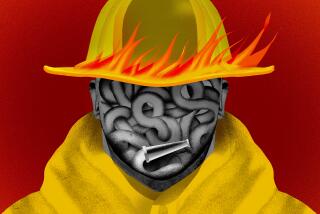SOCIAL ISSUES : Firefighter’s Death Forces Town to Face AIDS Fears
- Share via
EAST RANDOLPH, Vt. — To his comrades on the volunteer fire department here, David Lamson was like a loyal member of the family, a quiet farmer and bus driver who relished being part of the close-knit group that responds to local emergencies.
So when Lamson began suffering from mysterious fainting spells several years ago, there was concern among his fellow firefighters. That concern turned to shock and anger when they learned this spring that he was suffering from AIDS. The 47-year-old Lamson died of complications from the disease June 27.
The discovery of his illness and his subsequent death have shaken the department in this rural section of Randolph, a quiet town of 4,800 located 23 miles south of Montpelier. Some AIDS specialists say the town’s response also highlights the emotions--and sometimes misconceptions--that arise when the disease strikes in small towns.
Members of the 20-person department say they feel betrayed that Lamson, a four-year veteran of their unit, may have exposed them to the deadly disease without their knowledge.
“There is a bond between firefighters,” said Douglas Campbell, an assistant fire chief. “We just feel he broke that.”
First Assistant Fire Chief Jonathan Ashworth said that members do not feel Lamson was obliged to tell them about his disease. “But the feeling is that . . . he put us in danger.”
In the wake of Lamson’s death, the department has asked the town to pay for the costs of HIV tests for its volunteer firefighters. Campbell said most department members likely will be tested, even though some of their concerns were eased after a recent meeting with a physician specializing in AIDS treatment.
“Everybody really wants to be sure, to put their minds at ease,” Campbell said.
Even as the firefighters try to come to terms with the episode, some AIDS advocates say the events in East Randolph dramatize the lack of understanding that still exists in many small towns about the disease.
Gary Sexton, co-chairman of the Vermont People With AIDS Coalition, said the fears expressed by the East Randolph firefighters show that “we are not doing our job well in educating people” about AIDS.
Sexton said that provided they took routine safety precautions, such as wearing gloves when handling blood, the firefighters had no reason to fear becoming infected “unless they were having sex with this individual or exchanging needles.”
Terje Anderson, AIDS program chief for the Vermont Department of Health, said that even in this rural state, knowledge about AIDS is very high, as measured by surveys. The traveling AIDS quilt even made a brief stop in East Randolph last year.
But Anderson said that in a state that has seen just 205 diagnosed cases of AIDS, many people have not had direct experience with the disease.
Joshua Noble, client services consultant for Vermont Cares, a Burlington-based AIDS service agency, said ignorance about AIDS remains strong in many Vermont towns, something that has created a climate of fear for those with the disease.
Lamson never told others in the department what was ailing him, Noble said, because “he was afraid how people would think about him and treat his family who lived there.”
Noble said that even more than AIDS, the issue was one of homophobia, “the fact that this was a closeted gay man who lived among firefighters, shared quarters with them, spent time with them socially, and that they didn’t realize he was gay. This was a real slap in the face to them to have to confront that this was going on.”
More to Read
Sign up for Essential California
The most important California stories and recommendations in your inbox every morning.
You may occasionally receive promotional content from the Los Angeles Times.













